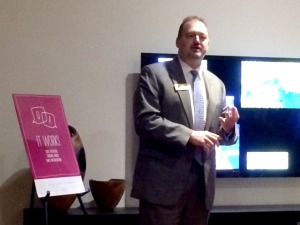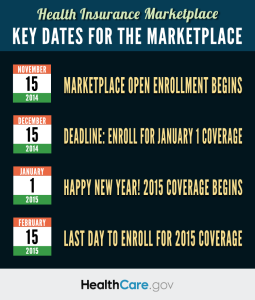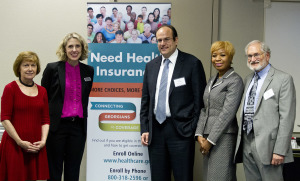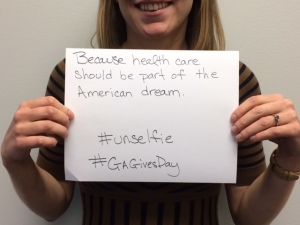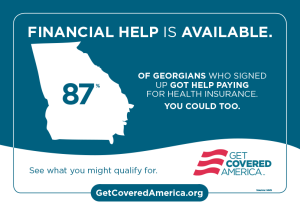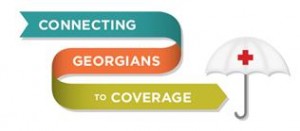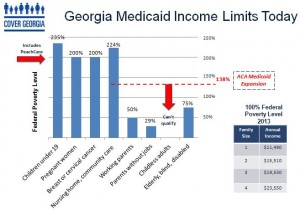Peach Pulse Archives
Open Enrollment Starts Saturday!
 If you receive our Peach Pulse, there’s a good chance you already know that open enrollment for health insurance starts this Saturday, November 15 and goes through February 15. Two important things to remember and share with your friends, family, colleagues, and community members:
If you receive our Peach Pulse, there’s a good chance you already know that open enrollment for health insurance starts this Saturday, November 15 and goes through February 15. Two important things to remember and share with your friends, family, colleagues, and community members:
- Even if you enrolled last year, you should go to healthcare.gov and shop around as your plan and premiums may have changed, or you may qualify for more financial assistance.
- Unless you qualify for an exemption, the penalty fee for not obtaining health insurance has risen to $325 or 2% of your income (whichever is higher).
Nykita Navigates
 With open enrollment starting this Saturday, our Navigator, Nykita, has been very busy! GHF is excited to highlight some of Nykita’s materials, as well as some great work from our partner organizations. The following materials are great to print out at home for your own use or if you’re helping others enroll.
With open enrollment starting this Saturday, our Navigator, Nykita, has been very busy! GHF is excited to highlight some of Nykita’s materials, as well as some great work from our partner organizations. The following materials are great to print out at home for your own use or if you’re helping others enroll.
- Affordable Care Act Basics: Guide to the Marketplace – Your basic guide to the ACA and the health insurance market place
- Marketplace Application Checklist – Your check list of what you should bring to your appointment with a Navigator (it’s longer than you think!).
- Health Insurance 101 – Not quite sure the difference between an HMO and a PPO? How about co-insurance and co-pay? This brochure will answer your questions.
- Enrollment Brochure – Important dates and numbers to remember throughout open enrollment.
- Navigator Resource Guide – Georgetown University’s Center on Health Insurance Reforms (CHIR) has launched its web-based Navigator Resource Guide on Private Health Insurance and the Health Insurance Marketplaces. Targeted at Navigators, this is an amazing resource to help answer the tough questions.
Medicaid Minute All eyes are on open enrollment, but for more than 400,000 Georgians, there still isn’t a health care option available. Our elected state officials have the power to solve this problem. The health care law was designed to provide a path to health insurance to all Americans, but our state government has to opt in to make that a reality. Governor Deal and the state legislature have so far declined to use federal tax dollars that have already been set aside to provide coverage to those in the gap, but the opportunity to accept this money is still available. We can opt in now by expanding Medicaid eligibility to all low-income Georgians who currently do not qualify. Still need more details? Click here to learn more.
It’s Not Too Late To Give!
 As you know, Georgia Gives Day is in full swing! The day isn’t over and as of sending time we are 30% of the way to achieving our goal of $1,000! Your participation and support allows us to continue the work we do: educating the public and our lawmakers, providing valuable resources to partner organizations and leading the charge for closing the coverage gap in Georgia. If you haven’t, please consider a small donation. To donate, click here.
MORE >
As you know, Georgia Gives Day is in full swing! The day isn’t over and as of sending time we are 30% of the way to achieving our goal of $1,000! Your participation and support allows us to continue the work we do: educating the public and our lawmakers, providing valuable resources to partner organizations and leading the charge for closing the coverage gap in Georgia. If you haven’t, please consider a small donation. To donate, click here.
MORE >
SBIRT: A Public Health Initiative
Yesterday, Georgians for a Healthy Future together with the Georgia Council on Substance Abuse unveiled our new initiative “Somebody Finally Asked Me…” at a benefit party held at the home of Iris and Bruce Feinberg. This project aims to prevent and address youth substance use disorders through increased use of an evidence-based public health approach known as SBIRT (Screening, Brief Intervention, and Referral to Treatment).
To learn more about SBIRT, click here.
If you were unable to attend the event and would like to make a donation to help us reach our fundraising goal for this project, click here.
Georgians for a Healthy Future awarded Robert Wood Johnson Foundation grant
Georgians for a Healthy Future (GHF) is excited to announce that we have been awarded a Consumer Voices for Coverage grant from the Robert Wood Johnson Foundation, the nation’s largest health philanthropy. Georgians for a Healthy Future will work in conjunction with Community Catalyst, who serves as the national program office for the Consumer Voices for Coverage program. As one of 18 state-based consumer health advocacy organizations around the country to receive a grant under the Robert Wood Johnson Foundation’s Consumer Voices for Coverage initiative, Georgians for a Healthy Future will develop and carry out collaborative and best-practice based strategies to maximize health insurance enrollment and retention, increase health insurance literacy, and create a more favorable policy environment for Georgia health care consumers. This project will have a particular emphasis on vulnerable and hard-to-reach populations in Georgia.
“We are honored to be part of the Consumer Voices for Coverage community and excited to deepen our work on behalf of Georgia health care consumers through this grant,” said Cindy Zeldin, Georgians for a Healthy Future’s Executive Director. “The health care policy landscape in Georgia and across the nation is rapidly changing, and it is critically important that there be a strong voice for consumers as these changes are determined and implemented.”
Georgians for a Healthy Future will draw upon our extensive experience and expertise in building and mobilizing coalitions as well as strong relationships with dozens of community organizations with deep reach across the state. These partnerships will be essential for outreach, dissemination of culturally and linguistically appropriate educational materials, and for soliciting feedback from diverse communities about the specific challenges faced regarding health insurance so that themes can be identified and shared with state policymakers and other key stakeholders and decision-makers.
About Georgians for a Healthy Future: Georgians for a Healthy Future’s mission is to build and mobilize a unified voice, vision, and leadership to achieve a healthy future for all Georgians. Since our founding in 2008, Georgians for a Healthy Future has provided substantive health policy information to community leaders and advocates throughout the state, conducted seminars to equip consumers with the tools to become strong advocates, successfully injected the consumer perspective into dozens of health care stories in the media, and engaged with policymakers to spark policy change for a healthier Georgia.
It’s Time to Get Covered
![]() Learn about your options for health care coverage at the LGBT Health Insurance Town Hall
Learn about your options for health care coverage at the LGBT Health Insurance Town Hall
Join Georgia Equality, Georgians for a Healthy Future and The Health Initiative on Thursday, November 13th at 7 pm at the Rush Center. Whether you still need health care coverage or you have coverage and want to re-enroll, you probably have questions about the upcoming open enrollment period. Consumers, just like you, who got enrolled in health coverage last year will share their experiences and advice. Navigators will be on hand to answer your questions about how to get covered or re-enrolled. Bring your coverage questions, your uninsured friends and family, and your health coverage stories. Open enrollment for 2015 coverage begins November 15, 2014 and ends February 15, 2015.
Bonus! We don’t know about you, but talking health care always works up our appetite – stop in at Radial Café before or afterwards to receive either 20% of your meal or order a special dinner for two for $30!
Click here to RSVP!
Not in Atlanta – We’ve still got you covered!
Because we know that many of you have questions about your coverage options and what to look for in a health insurance plan, we will also be live-streaming the town hall meeting. You’ll not only be able to watch the presentations in real time, you’ll also be able to ask your questions of our panelists and experts.
Click here to RSVP for the live-stream!
Children’s Health Insurance Program in Danger
The Children’s Health Insurance Program (CHIP) provides health insurance for children whose families make too much to allow the children to be covered by Medicaid, but make too little to be able to provide insurance for their children themselves. CHIP covers 7.7 million children nationwide and 220,000 in Georgia. Georgia’s CHIP program is called PeachCare for Kids (aka PeachCare). . PeachCare is administered by the state of Georgia and jointly financed by the state and federal government.
PeachCare provides coverage for primary, preventive, specialty, dental and vision care for enrolled children ages 18 and under. In addition, the insurance covers hospitalization, emergency room visits, prescription medications and mental health care. PeachCare helps ensure the well-being of many Georgia children who may not be covered otherwise.
Future funding for the program is in danger. Even though the program is legislated to exist until 2019, Congress has only approved funding for CHIP until next September. By choosing not to approve federal dollars for CHIP in the 2016-2019 budgets, Congress would leave millions of children without access to health insurance and would shift the financial burden of covering our kids to the Georgia state budget.
Contact your Congressperson and ask them to make sure that Congress secures CHIP funding through 2019.
For more information visit Voices for Georgia’s Children and the Georgetown Center on Children and Families.
Medicaid Minute
Looking for more proof of why we should close the coverage gap? A nonpartisan Kaiser Family Foundation analysis reported that states that have not expanded Medicaid and closed the coverage gap (like Georgia) will see a greater increase in spending than those that have. In states like Georgia we can expect to see a 6.8 percent increase in tax dollars going to support Medicaid in fiscal year 2015. That compares to a 4.4 percent rise in states that have closed the coverage gap already.
Nykita Navigates!
 In the last edition of our Peach Pulse newsletter, we introduced you to Nykita Howell, Georgians for a Healthy Future’s new health insurance navigator. Nykita has hit the ground running in her new position in advance of health insurance open enrollment, which begins November 15!
In the last edition of our Peach Pulse newsletter, we introduced you to Nykita Howell, Georgians for a Healthy Future’s new health insurance navigator. Nykita has hit the ground running in her new position in advance of health insurance open enrollment, which begins November 15!
If you are part of a community-based organization and would like to learn more about the types of health insurance options available to your community members and gain a better understanding of how to enroll in coverage, please feel free to contact Nykita to request a presentation. If you are an individual consumer in need of health insurance enrollment assistance, you can also contact Nykita to set up an appointment.
What does a navigator do, you might ask?
Health insurance navigators help consumers determine their eligibility for health insurance and for advanced premium tax credits through the Health Insurance Marketplace, provide enrollment assistance to consumers by helping them prepare their applications, and conduct outreach and education to raise awareness about the Marketplace. Navigators receive training and are certified at both the state and federal levels. They provide free and unbiased services to consumers.
Georgians for a Healthy Future is part of a consortium of 12 nonprofit organizations led by Seedco that received a federal navigator grant from the US Department of Health and Human Services. That funding supports this important service.
Events in the next two weeks:
- Community Church of God and Christ (Atlanta, GA), November 15, 2014 1pm to 4pm
Infographic of the Week!
MORE >Navigators and the Consumer Experience
Georgians for a Healthy Future partnered with Seedco at a briefing in Atlanta on October 16 to present and discuss findings from a comprehensive evaluation of the impact of health insurance navigators on consumer experiences during the first open enrollment period. The evaluation was conducted by a team of researchers at the University of Georgia, and its key findings include:
- Navigators succeeded in assisting consumers from diverse communities and in reaching those in need of affordable health services
- Rates of achieving enrollment or application success with navigators differed by region, by demographics, and by consumer financial status
- Navigator interpersonal communications, and especially follow-up, was the biggest factor in consumer satisfaction
As we gear up for the next open enrollment period, which begins on November 15, 2014, the findings from this report can inform the work of enrollment assistance personnel and community-based organizations in Georgia and across the country. Selected recommendations from the report include:
- Continue partnering with community agencies that serve diverse populations
- Publicize the navigator role and concrete ways to access free in-person assistance
- Follow up with consumers after they receive in-person assistance
For a summary document highlighting and describing these and other key findings and recommendations, click here. To read the full study, click here.
Georgians for a Healthy Future Met the Press!
GHF’s Executive Director Cindy Zeldin met last week with the Kaiser Family Foundation’s (KFF) Media Fellows and shared her perspective as a consumer health advocate with the group. The KFF Media Fellows are highly regarded health care journalists from major national and local publications who spent three days in Georgia discussing and learning about the implementation of the Affordable Care Act (ACA) and other health policy issues in the state from local experts, advocates, academics, and practitioners. Georgians for a Healthy Future was honored to be a part of their agenda.
The fellows prepared for their visit to Georgia by reading KFF’s new “The Georgia Health Care Landscape.” This document provides a comprehensive overview of Georgia’s population health, the implementation of the ACA in Georgia, and Georgia’s health care infrastructure. It is an excellent primer for those who want to know more about Georgia’s health care landscape or who want to have key Georgia health care stats at your fingertips. Some facts in particular stand out from the issue brief:
- As of January 2014, 22% of uninsured Georgians were in the coverage gap, meaning they were ineligible for Medicaid because Georgia has not expanded its program and earned too little to qualify for premium subsidies for private coverage.
- 87% of Georgians who enrolled in health coverage through the Marketplace received premium subsidies to purchase coverage.
- Georgia has many Health Professional Shortage Areas and a high level of unmet need for care. As of August 2014, only 59% of the primary health care need in Georgia was being met. Even worse, only 45% of the need for mental health care services and 28% of the need for dental services were being met.
- More than one in five non-elderly people in Georgia is uninsured, and high unemployment rates and poorer than average health care outcomes for many measures suggest a greater need for health coverage among many low-income Georgians.
Georgia Gives day is 26 days away!
We’re hoping for a big turnout for Georgia Gives Day on November 13th for Georgians for a Healthy Future (GHF), but there’s something you can do between now and then and it takes almost no time! Take a picture, like the one below, and tell us why you support our work and quality access to health care. Include the hashtags #GAGivesDay and #unselfie and tag us on Facebook or include our twitter handle @healthyfuturega to enter us to win $500 from GA Gives Day! It’s a competition, so go to GA Gives Facebook page and vote for your favorite GHF submission!
Your support and participation doesn’t just support GHF but it supports accessible, quality and affordable health care for all Georgians. Don’t forget to check back with us on November 13th to make a donation and show your support for health equity and for GHF!
GHF Welcomes New Staff: Health Insurance Navigator Nykita Howell
 Georgians for a Healthy Future is excited to welcome Nykita Howell, our new Health Insurance Navigator, who joined us this week! In this role, Nykita provides Marketplace enrollment assistance to Georgia health care consumers. Prior to joining Georgians for a Healthy Future, Nykita worked in the fields of clinical and community based research and as a navigator for the first open enrollment period of the national Health Insurance Exchange. Her research efforts have been on studies focused on retention strategies for an NIH-funded cohort based at Umass Medical School, and a church-based diabetes project housed at Mercer University. Her work as a navigator prior to joining Georgians for a Healthy Future included building community partnerships and educating consumers over a seven county area. She holds an MPH from Mercer University School of Medicine and is a Certified Health Education Specialist. Prior to her graduate studies, Nykita received her B.S. in Biology from Clark Atlanta University, in Atlanta, GA. If you or anyone you know needs assistance navigating the health care system, please contact Nykita at nhowell@healthyfuturega.org or 404-567-5016. Remember, open enrollment begins Nov. 15th—just one month away!
Georgians for a Healthy Future is excited to welcome Nykita Howell, our new Health Insurance Navigator, who joined us this week! In this role, Nykita provides Marketplace enrollment assistance to Georgia health care consumers. Prior to joining Georgians for a Healthy Future, Nykita worked in the fields of clinical and community based research and as a navigator for the first open enrollment period of the national Health Insurance Exchange. Her research efforts have been on studies focused on retention strategies for an NIH-funded cohort based at Umass Medical School, and a church-based diabetes project housed at Mercer University. Her work as a navigator prior to joining Georgians for a Healthy Future included building community partnerships and educating consumers over a seven county area. She holds an MPH from Mercer University School of Medicine and is a Certified Health Education Specialist. Prior to her graduate studies, Nykita received her B.S. in Biology from Clark Atlanta University, in Atlanta, GA. If you or anyone you know needs assistance navigating the health care system, please contact Nykita at nhowell@healthyfuturega.org or 404-567-5016. Remember, open enrollment begins Nov. 15th—just one month away!
Medicaid Minute: 60% Support Closing the Coverage Gap!
A new report on consumers’ experiences and views on health care found that 60% of Georgians disapprove of the state’s decision not to expand Medicaid, which includes 43% who strongly disapprove. Over 90% of Georgians think Medicaid is important – and we agree! It’s time to close the coverage gap and provide a pathway to coverage for all Georgians. Follow @healthyfuturega on Twitter to stay up-to-date about our efforts to #coverga.
Infographic of the Week
From our partners at Enroll America!
Join us for a benefit party!
Please join Georgians for a Healthy Future (GHF) and the Georgia Council on Substance Abuse on October 29 from 6 to 8 PM for our SBIRT (Screening, Brief Intervention, and Referral to Treatment) Benefit Party to launch our new public advocacy campaign – Somebody finally asked me! The project seeks to prevent youth substance use disorders through the implementation of universal screening. In addition to launching our SBIRT project, we have been challenged to raise $30,000 in Georgia to help support this work—a big opportunity to leverage the national dollars coming into Georgia through the Hilton Foundation. We hope you will join us and make a gift that is meaningful to you as we work together towards this goal. To learn more about this project click here. To RSVP now, click here.
GHF Executive Director is honored by the League of Women Voters
Georgians for a Healthy Future’s Executive Director Cindy Zeldin was honored last week by the League of Women Voters with an Empowerment Award at their annual lunch. GHF is so proud of Cindy’s dedication to health advocacy throughout the last five years!
Next in Health Care: Network Adequacy Explained
 When consumers enroll in a health insurance plan, they gain access to a network of medical providers. Insurance companies contract with a range of providers, including both primary care and specialty physicians, to deliver health care services included within the plan’s benefit package. This network of providers must be adequate to ensure that consumers enrolled in the plan have reasonable access to all covered benefits. This is what is meant by network adequacy. More specifically, to be considered adequate, a network must provide adequate numbers, types, and geographic distribution of providers; must ensure that access to care is timely; and must include essential community providers that serve predominantly low-income, medically underserved individuals. Additionally, accurate information about providers must be made available to consumers.
When consumers enroll in a health insurance plan, they gain access to a network of medical providers. Insurance companies contract with a range of providers, including both primary care and specialty physicians, to deliver health care services included within the plan’s benefit package. This network of providers must be adequate to ensure that consumers enrolled in the plan have reasonable access to all covered benefits. This is what is meant by network adequacy. More specifically, to be considered adequate, a network must provide adequate numbers, types, and geographic distribution of providers; must ensure that access to care is timely; and must include essential community providers that serve predominantly low-income, medically underserved individuals. Additionally, accurate information about providers must be made available to consumers.
Network adequacy has become a hot topic over the past several months because many consumers who enrolled in new health plans through the Health Insurance Marketplace found that their plan came with a narrow network of providers. Provider directories weren’t always accurate or up-to-date, and consumers expressed a fair amount of confusion over which providers were in their plan’s network.
At the same time, the National Association of Insurance Commissioners (NAIC), which develops model laws and rules that states often adopt, has been working to update its network adequacy model law. Stakeholders ranging from insurers to medical providers to patient and consumer advocates are weighing in on this process, making network adequacy a hot topic in the policy arena too. Georgians for a Healthy Future has been monitoring this process through the participation of our executive director as one of the consumer representatives to the NAIC. Earlier this summer, the consumer representatives submitted comments to the NAIC focusing on developing a stronger standard and better oversight of network adequacy, an end to “balance billing” by out-of-network providers in in-network facilities, and greater transparency of provider networks.
Georgians for a Healthy Future will continue to monitor this process and will advocate at all levels, in conjunction with state and national partners, to ensure consumers have meaningful access to care.
If you are an individual consumer enrolled in a commercial health plan and the provider directory you were given was incorrect or if you have concerns about your ability to access covered services under your plan, please contact the Georgia Office of Insurance & Fire Safety, Consumer Services Division by calling (800) 656-2298 or use the Consumer Complaint Portal at www.oci.ga.gov/ConsumerService. Please also consider sharing your story with Georgians for a Healthy Future so we can get a better picture of what is happening in our state.
For more information on network adequacy, please see the following reports and resources:
From Georgetown Center on Health Insurance Reforms: Reforming State Regulation of Provider Networks: Efforts at the NAIC to Re-Draft a Model State Law
From Robert Wood Johnson Foundation and Georgetown University Health Policy Institute: ACA Implications for State Network Adequacy Standards
From Families USA: Network Adequacy and Health Equity: Improving Private Health Insurance Networks for Communities of Color
Connecting Georgians to Coverage
The ACA and people living with HIV/AIDS: what you need to know
![]() The Affordable Care Act (ACA) makes health insurance more affordable, more accessible, more understandable, and more complete for all Georgians. Health care and health insurance are especially important to people living with HIV/AIDS (PLWHA) so that they can stay healthy and well. PLWHA often have very specific needs and questions regarding their health coverage and care options. To answer them, Georgians for a Healthy Future and Georgia Equality have created a fact sheet that breaks down the biggest concerns and decisions for PLWHA. The fact sheet details new rights and protections under the ACA, walks through important questions to ask prior to choosing a health plan, and provides contacts for further assistance.
The Affordable Care Act (ACA) makes health insurance more affordable, more accessible, more understandable, and more complete for all Georgians. Health care and health insurance are especially important to people living with HIV/AIDS (PLWHA) so that they can stay healthy and well. PLWHA often have very specific needs and questions regarding their health coverage and care options. To answer them, Georgians for a Healthy Future and Georgia Equality have created a fact sheet that breaks down the biggest concerns and decisions for PLWHA. The fact sheet details new rights and protections under the ACA, walks through important questions to ask prior to choosing a health plan, and provides contacts for further assistance.
This fact sheet was made to be shared! You can view and download this new fact sheet on the GHF website. If you would like hard copies to distribute to your members, clients, or community partners, please contact Laura Colbert, GHF’s Community Outreach Manager at lcobert@healthyfuturega.org.
Georgia Gives Day
 Georgians for a Healthy Future works hard every day to bring about our vision of a day when all Georgians have access to the health care services they need to lead productive lives and contribute to the health of their communities. Whether we’re enrolling people in health insurance, advocating on behalf of health care consumers at the state capitol, working to address substance use among young adults, or convening a coalition to expand Medicaid, we are focused on you and your health.
Georgians for a Healthy Future works hard every day to bring about our vision of a day when all Georgians have access to the health care services they need to lead productive lives and contribute to the health of their communities. Whether we’re enrolling people in health insurance, advocating on behalf of health care consumers at the state capitol, working to address substance use among young adults, or convening a coalition to expand Medicaid, we are focused on you and your health.
November 14th is Georgia Gives Day. This is a day for Georgians across the state to express their support for the non-profit organizations that enrich our lives. We hope that you will put November 14th on your calendar and take a few minutes out of your day to support Georgians for a Healthy Future by making a small contribution. Look for alerts leading up to the day and please follow us on Facebook and Twitter as we celebrate and work toward our vision of a healthy Georgia.
Stories that Cause Change: How you can make a difference!
The public discussion around the Affordable Care Act is often about its politics. What the pundits miss is that each person’s experiences-whether it is the elation, relief, and sense of security that come with enrolling in health insurance for the first time or the frustration that comes from finding out you fall into the coverage gap–is important. Whatever your story, we want you to share it with us!
Volunteer! Throughout open enrollment we will be talking to consumers throughout the state. You can help us in this important effort by attending an event in your neighborhood and talking to consumers. We will prepare you with supplies and materials, a how-to guide, and more. If you would like to help out, please email our outreach manager, Laura Colbert.
Share your story and encourage others to do the same. If you or someone you know has successfully enrolled in a health insurance plan through the marketplace, tell us about it. If you fall in the coverage gap, let us know. If you are able to access care that you couldn’t afford before, we want to hear about it. Tell us your story by contacting our communications coordinator, Anna Cullen.
Together we can make a change.
Medicaid Minute: Uncompensated Care Cost
 Last week, HHS released a report highlighting one way Georgia can help our hospitals and reduce uncompensated care costs: closing the coverage gap by expanding Medicaid. In states that have expanded, uninsured/self-pay admissions as well as uninsured/self-pay emergency visits have fallen. Those same states have seen hospital admissions for patients with Medicaid increase. In short, they have more paying customers. And Georgia is getting left out. The report shows a $5.7 billion savings to hospitals in uncompensated care because of the Affordable Care Act. $4.2 billion (74%) of those savings will be to states that have expanded. Just one more reason why closing the coverage gap is the best option for Georgia’s economy and Georgia’s people!
Last week, HHS released a report highlighting one way Georgia can help our hospitals and reduce uncompensated care costs: closing the coverage gap by expanding Medicaid. In states that have expanded, uninsured/self-pay admissions as well as uninsured/self-pay emergency visits have fallen. Those same states have seen hospital admissions for patients with Medicaid increase. In short, they have more paying customers. And Georgia is getting left out. The report shows a $5.7 billion savings to hospitals in uncompensated care because of the Affordable Care Act. $4.2 billion (74%) of those savings will be to states that have expanded. Just one more reason why closing the coverage gap is the best option for Georgia’s economy and Georgia’s people!
MORE >
 Covering Kids: Health Insurance for the Whole Family
Covering Kids: Health Insurance for the Whole Family
New from GHF!
All kids need reliable access to quality health care. Children need to see the doctor even when they are healthy: shots for school, well-child visits, and dental care are all important for kids to grow up healthy and strong. Their parents need coverage too to stay on track with regular screenings and preventive care, to access the health care system if they become sick, and to experience the financial peace of mind that comes with being covered.
Thanks to new health insurance options available through the Marketplace, the uninsured rate among parents is dropping. Still, too many of Georgia’s low-income parents fall into what has become known as the “coverage gap,” meaning they don’t earn enough to qualify for subsidized private insurance and they earn too much to qualify for Medicaid because Georgia has so far declined to join the 27 states (and counting!) who have expanded Medicaid.
In an effort to provide accurate information to parents about the coverage options for themselves and their children, GHF has created a set of fact sheets about health insurance coverage for kids and parents in Georgia. These fact sheets are intended to be a resource for individual consumers and for organizations who represent or provide services for Georgia families.
Affordable Health Care for Your Children and For Uninsured Parents help parents understand the coverage options for themselves and their children. If you work with low- to moderate-income families through a charity care clinic, at a school or church, or in a community-based organization, you may want to provide these resources to the families you serve.
Covering Kids paints a picture for policy makers and the media who want to better understand children’s health care coverage in Georgia. If you work with policy makers or want to talk to your legislators about health care coverage for kids, this fact sheet will be a helpful resource.
A fourth fact sheet serves as a reference for those who need to know the income limits for the Medicaid and PeachCare programs.
You can view and download these new fact sheets on the GHF website. If you would like hard copies to distribute to your members, clients, or community partners, please contact Laura Colbert, GHF’s Community Outreach Manager.
 Connecting Georgians to Converage: GHF’s Navigator Program Will Again Assist During Open Enrollment!
Connecting Georgians to Converage: GHF’s Navigator Program Will Again Assist During Open Enrollment!
Last week, the U.S. Department of Health and Human Services (HHS) awarded health insurance navigator grants to 90 organizations in states with federally facilitated or partnership marketplaces. Health insurance navigators help consumers understand and compare health insurance options, enroll in coverage, determine eligibility for tax credits, and utilize new coverage once enrolled. Georgians for a Healthy Future is excited to announce that, for the second year in a row, we are part of a consortium of 12 nonprofit organizations, led by the national nonprofit organization Seedco, which received one of two grants for Georgia!
With the next open enrollment period just 58 days away, we are already getting ready. In the coming weeks Georgians for a Healthy Future will bring on a full-time health insurance navigator who will work closely with consortium partners to provide outreach, education, and enrollment assistance to Georgia individuals and families. More than 300,000 Georgia consumers signed up for coverage during last year’s open enrollment period, but hundreds of thousands more who are eligible for affordable coverage remain uninsured. Reaching these uninsured Georgians will require targeted outreach strategies and new partnerships with local community-based organizations throughout the state. Additionally, consumers who enrolled during the last open enrollment period will need assistance navigating re-enrollment and may have questions about how to understand and use their new coverage. Health insurance navigators played a critical role during the first open enrollment period and are poised to assist consumers again this fall, when the second open enrollment period begins.
Georgians for a Healthy Future is honored to participate in these efforts.
Click here to see a full list of organizations that have received funding through Seedco.
Stories That Cause Change: How You Can Make a Difference!
Did you recently sign up for health insurance for the first time? Were you locked out of the market before because you had a pre-existing condition? Was insurance too pricey for you in the past and did you finally find an affordable plan that meets your needs? Or maybe you tried to enroll in coverage and found out that you fell in the “coverage gap” and can’t gain eligibility for Medicaid until Georgia policymakers move forward with Medicaid expansion? Or perhaps you enrolled in coverage but have had difficulty accessing an in-network provider nearby? Whatever your health care story is, we want you to share it with us!
The public discussion around the Affordable Care Act is often about its politics. What the pundits miss is that each person’s experiences-whether it is the elation, relief, and sense of security that come with enrolling in health insurance for the first time or the frustration that comes from finding out you fall into the coverage gap–is important. Georgians for a Healthy Future believes that telling those stories is a powerful tool that can help bring about a better policy environment for health care consumers in Georgia. Over the next several months, GHF, along with other organizations within the Cover Georgia coalition, will collect these stories and share them across the state.
To do this, we need your help in two important ways:
- Volunteer! Throughout open enrollment we will be talking to consumers throughout the state. You can help us in this important effort by attending an event in your neighborhood and talking to consumers. We will prepare you with supplies and materials, a how-to guide, and more. If you would like to help out, please email our outreach manager, Laura Colbert.
- Share your story and encourage others to do the same. If you or someone you know has successfully enrolled in a health insurance plan through the marketplace, tell us about it. If you fall in the coverage gap, let us know. If you are able to access care that you couldn’t afford before, we want to hear about it. Tell us your story by contacting our communications coordinator, Anna Cullen.
Together we can make a change.
Medicaid Minute
Every day that Georgia does not close the coverage gap and expand Medicaid, federal dollars are lost. To show just how much we are really losing, Pro Georgia has created a Georgia Medicaid Counter to track the dollars lost in real time. Below is the code it embed it on your website. Please use and share!
<script type=”text/javascript” src=”http://progeorgia.org/wp-content/uploads/2014/01/counter.js”></script>
MORE >
New from GHF: ACA and the LGBT Community
- What health care rights and protections do legally married same-sex couples have in states like Georgia that don’t currently recognize same-sex marriage?
- Can health insurance navigators help consumers find LGBT-friendly plans? (Hint – yes they can!)
- How can a consumer file a complaint if they experience discrimination?
- What new health care rights and protections do transgender individuals have?
The Affordable Care Act makes health insurance and health care more understandable, more accessible, more affordable, and more comprehensive for Georgians, no matter their gender identity. Georgians for a Healthy Future and Georgia Equality have teamed up to develop a new set of LGBT specific fact sheets to answer some of these challenging questions that LGBT individuals and families face as they seek out, enroll in, and use their health coverage.
These fact sheets are intended to be a resource for individual consumers and for organizations who represent or provide services tailored to LGBT Georgians. You can view and download these new fact sheets here. If you would like hard copies to distribute to your members, clients, or community partners, please contact Laura Colbert, Georgians for a Healthy Future’s Community Outreach Manager.
Health Insurance Options For Georgia’s LGBT Community
Love and Marriage: Health Insurance Rights for LGBT families

There is one day left for the 20,900 Georgians who received letters from the Federally Facilitated Marketplace (FFM) asking for citizenship verification. Georgians who haven’t responded by September 5th will see their health care coverage end on September 30th. Consumers whose coverage is canceled may be required to pay back some or all of the tax credits they received.
If you or someone you know has received this letter, please visit LocalHelp.HealthCare.gov and type in your zip code. This will take you a list of organizations with health care Navigators – licensed professionals who can walk you through what needs to be done and how to get it done by the deadline. Click here assistance.
For up to the second information on this time sensitive issue, follow the twitter hashtags #BySept5 #StayCovered #Asegurate

SBIRT, GCSA, and NRM: Acronyms You Should Know
More than 300,000 Georgians have enrolled in health insurance since last October, when new coverage opportunities became available through the Health Insurance Marketplace. These big coverage gains present an opportunity to raise awareness about the importance of prevention, both among consumers and policymakers. We are already seeing the lifesaving impact that services like cancer screening, blood pressure checks, and mammograms are having. One screening tool not broadly talked about is Screening, Brief Intervention, and Referral to Treatment (SBIRT). SBIRT is a cost-effective way to identify individuals who are at risk of developing a substance use disorder and can often prevent the development of addiction or refer those in need to treatment. Studies have shown every $1 invested in SBIRT yields $4 in savings. This important set of preventive tools should be available to all Georgians, particularly to our state’s youth.

This important set of preventive tools should be available to all Georgians, particularly to our state’s youth. The rise in heroin use among Georgia adolescents has gained widespread attention in recent months, but the problems goes beyond just heroin. By the time a student reaches ninth grade, 1 in 5 will display signs of alcohol use, a rate which rises to 2 in 5 by the twelfth grade. Approximately 20 percent of twelfth-graders are also engaging in drug use. We know that drug and alcohol use that starts in adolescence all too often becomes a lifelong habit. In fact, 90% of adults with a substance use disorder began using alcohol and/or drugs before the age of 18 and half under the age of 15. With an increased awareness and use of SBIRT, we can work together to prevent drug and substance use disorders among Georgia’s youth and help them lead healthier and more productive lives. To raise awareness about substance use disorders among Georgia’s youth as a public health challenge that can be addressed through prevention, Georgians for a Healthy Future and the Georgia Council on Substance Abuse (GCSA) have teamed up to raise awareness of and advocate for widespread use of SBIRT.
The GHF/GCSA campaign starts now, taking advantage of the spotlight already on the issue during the month of September: National Recovery Month. Throughout the month, GCSA will participate in more than 20 events statewide to rally support, increase awareness, and connect people to the care they need. See if there’s an event in your area! The theme for this year’s Recovery Month is “Join the Voices for Recovery: Speak Up, Reach Out,” and we hope you will follow suit by speaking up and reaching out to those around you. This is a crucial health issue that touches so many lives – join GHF and GCSA’s commitment to SBIRT and dedicated youth screening and early intervention efforts. Stay posted for more information about SBIRT and recovery throughout the month!
For more information about teen substance abuse, please visit http://www.drugfree.org/. If a teen if your life is struggling with addiction, please call the Substance Abuse and Mental Health Services Administration hotline number (800) 662-HELP or (800) 662-4357 or the Georgia Crisis and Access Line 0 1.800.715.4225 or www.mygcal.com .

THE GOOD NEWS: Thanks to the Affordable Care Act, in October of 2015 the federal match rate for PeachCare for Kids increases from 75 percent to 93 percent. This means that Georgia’s financial responsibility for PeachCare for Kids will decline from 25 percent of program costs to 7 percent. This is great news for Georgia’s children!
THE BAD NEWS: Funding for PeachCare for Kids is only guaranteed through September 2015. That’s right, this crucial program that has been so successful in keeping Georgia’s children healthy is precariously close to running out of money.
PeachCare for Kids, Georgia’s Children Health Care Insurance Program (CHIP), provides more than 220,000 children with access to primary, preventive, specialist, dental care and vision care as well as hospitalization, emergency room services, prescription medications and mental health care services. PeachCare for Kids serves children in families who earn too much to qualify for Medicaid but still cannot afford private health insurance. The program, which started in 1999, leverages federal dollars to support the state’s commitment to access to care for our state’s children. PeachCare for Kids has been very successful, with Georgia ranking 8th in the nation for the number of enrolled children.
How can you help? Let your Congressman know that CHIP/PeachCare works and we want it to keep working! Click here to find your federal Representative and Senator and their contact information. For up to date information on this developing issue, follow GHF on Facebook and Twitter.
Medicaid Minute
For Georgians who fall into the coverage gap,
living without health insurance and access to comprehensive health care services is a part of everyday life. To raise awareness about the importance of this issue, Mercy Care took to the streets, bringing it into the everyday lives of Atlanta workers on their lunch break with a flash mob! We may not like that Georgia hasn’t expanded Medicaid, but we sure were happy to see this display of support in Woodruff Park! Click the picture to check it out!
Georgians for a Healthy Future is honored to call Mercy Care a partner in the campaign to close the coverage gap in Georgia. To learn more about the Cover Georgia campaign to expand Medicaid in Georgia, visit www.coverga.org. If your organization would like to join the coalition, please contact Laura Colbert, Georgians for a Healthy Future’s Community Outreach Manager.
Thank you for helping us celebrate our first five years of health advocacy!
Georgians for a Healthy Future is celebrating our fifth anniversary this year, and last week we gathered to reflect on the important role that consumer health advocacy plays in Georgia and look ahead to the next five years. Thank you to our speakers, Dr. Gary Nelson, President of the Healthcare Georgia Foundation, and Andy Miller, CEO and Editor of Georgia Health News, and to Georgians for a Healthy Future’s board members, friends, and supporters for coming out celebrate our work and gear up for the work ahead.
Click on any photo to visit our Facebook page to see the entire album and our timeline highlighting our work over the past 5 years!
GHF welcomes new Communications Coordinator!
 Georgians for a Healthy Future is excited to welcome Anna Cullen as our Communications Coordinator! In this capacity she will work to strategically develop and implement concise and effective messages across multiple outlets – from traditional to social media as well as stakeholder communications. Anna comes to Georgians for a Healthy Future from the United States House of Representatives where she worked as a Legislative Assistant for a senior member of Congress and gained a strong understanding of the most effective tools to activate change in a divisive political atmosphere. In that capacity Anna also managed the congressman’s external communications as well as interactions with agency officials and stakeholders within her policy portfolio which included environment, energy, social justice, housing and health issues. Anna earned her B.A. in Communications, Legal Institutions, Economics, and Government from American University in Washington D.C. We’re thrilled to have Anna on board–please feel free to welcome her to GHF and to contact her atacullen@healthyfuturega.org!
Georgians for a Healthy Future is excited to welcome Anna Cullen as our Communications Coordinator! In this capacity she will work to strategically develop and implement concise and effective messages across multiple outlets – from traditional to social media as well as stakeholder communications. Anna comes to Georgians for a Healthy Future from the United States House of Representatives where she worked as a Legislative Assistant for a senior member of Congress and gained a strong understanding of the most effective tools to activate change in a divisive political atmosphere. In that capacity Anna also managed the congressman’s external communications as well as interactions with agency officials and stakeholders within her policy portfolio which included environment, energy, social justice, housing and health issues. Anna earned her B.A. in Communications, Legal Institutions, Economics, and Government from American University in Washington D.C. We’re thrilled to have Anna on board–please feel free to welcome her to GHF and to contact her atacullen@healthyfuturega.org!
MORE >

Celebrating 5 years!
It’s been five years since Georgians for a Healthy Future launched in 2009 with a commitment to provide a strong voice for Georgia health care consumers and communities as health policy is made in our state, and it’s been an action-packed five years!
Please join our board, staff, and our longtime champions on the evening of August 7th as we reflect on our successes and challenges over the past five years and look ahead to the next five.
We’ll hear remarks from our special guests Dr. Gary Nelson, President of the Healthcare Georgia Foundation, and Andy Miller, CEO and Editor of Georgia Health News.
Thompson Hine
3560 Lenox Road NE
Suite 1600
Atlanta, GA 30326-4266

Anouncing New Initative to Fight Stubstance Abuse Among Georgia’s Youth
Young people in Georgia are gaining access to health insurance at historic levels, creating new opportunities to increase access to essential prevention and treatment services. At the same time, misuse of and addiction to alcohol and drugs blunt the potential of too many young Georgians. To fight this drug epidemic, Georgians for a Healthy Future and the Georgia Council on Substance Abuse are launching an initiative to expand services to prevent addiction in youth.
Together, the two organizations will run a three-year project in Georgia to improve access to effective screening and intervention services that can minimize the destructive consequences of alcohol and drug misuse and addiction among our youth. This new effort, focused on youth ages 15 to 22, will combine a cost-effective public health approach called Screening, Brief Intervention and Referral to Treatment (SBIRT) with the power of consumer-led advocacy. Georgia is one of five states selected to participate in the national project managed by Community Catalyst, a national, non-profit consumer advocacy organization, and funded by a grant from the Conrad N. Hilton Foundation.
The project aims to improve access and coverage for early screening and intervention services by increasing both the number and type of locations where youth can access those services, and increasing the number and type of professionals who can conduct screening and brief intervention. For the full project launch announcement, click here.

Georgians for a Healthy Future is excited to welcome Laura Colbert, our new Community Outreach Manager! Laura joins GHF from Children’s Healthcare of Atlanta’s Strong4Life initiative. She spent her first two years as the Camp Director for Camp Strong4Life, a camp program for overweight and obese children and their families and the last two years developing and overseeing Strong4Life’s community partnerships and outreach efforts. Laura has an MPH from Emory University, where she focused on health literacy and the social determinants of health. Before moving to Atlanta, Laura attended UGA, where she earned her B.S.Ed in Kinesiology. At Georgians for a Healthy Future, Laura will manage community outreach to build, maintain, and strengthen relationships with community partners statewide. We’re thrilled to have Laura on board–please feel free to welcome her to GHF and to contact her at lcolbert@healthyfuturega.org!

WHAT’S HAPPENING IN GEORGIA
Georgia’s Health Insurance Marketplace is open for business
On Tuesday, October 1, 2013, Georgia’s Health Insurance Marketplace opened for business. Uninsured Georgians can now go to www.healthcare.gov to shop the Marketplace and see what insurance plan makes the most sense for them and their families. Open enrollment runs from October 1 to March 31 so there is plenty of time for consumers to take their time, research their options, and pick a plan that works for them.
The work of outreach and education to communities across our state will never be more important. 78% of people report that they do not know about the Marketplace or how it will affect them—we are working hard to change this! Georgians for a Healthy Future along with Seedco and our other navigator consortium partners is working hard to make sure we are connecting Georgians to coverage. We cannot do it alone and we hope we can count on your support and partnership. To read more about the launch of open enrollment, click here.
New Open Enrollment Resource Center
There is a new resource center on the Georgians for a Healthy Future website that is a centralized destination for everything consumers and community partners might need related to the Health Insurance Marketplace. There they can find resources, tools, updates and more about new opportunities for healthcare coverage as we move forward with implementation of the Affordable Care Act. Visit and refer others to the resource center to find:
Be sure to check the resource center frequently for updates and new resources.
Insurance plan data now available for browsing
Since the launch of www.healthcare.gov, consumers have had a difficult time creating an account, logging in and browsing information about insurance plans. To help more people shop and enroll in these new coverage options, HHS has added more servers and engineers, and improved the system configuration so it can handle more volume and will have shorter wait times. HHS has designed the system to be dynamic, and will continue to make adjustments to improve the consumer experience.
As of late last week, HHS allows consumers to preview Marketplace health plans and prices available in their area without having to create an account. To find out their actual costs, consumers will still need to apply. The estimates provided on this site do NOT include the premium subsidies. Individuals between 100% and 400% of federal poverty level (FPL) are eligible for subsidies in the exchange that make their insurance more affordable. To calculate the premium assistance they may be eligible for, consumers can visit the Kaiser Family Foundation’s subsidy calculator.
HHS will continue to work with consumers during the next six months to get people enrolled in the health insurance plans they need and want. People have until December 15 to apply for coverage starting January 1, 2014, but open enrollment is on-going through March 31, 2014.
THE UNINSURED IN GEORGIA
Georgians in the coverage gap
The Affordable Care Act was originally drafted so that individuals making up to 138% FPL (approx. $15,000 for an individual or $27,000 for a family of 3) would be eligible for Medicaid. The Supreme Court decision in June 2012 made this optional for states and to date, Georgia has not elected to expand coverage through Medicaid. The ACA also authorizes individuals between 100% and 400% FPL to receive premium subsidy assistance to make their insurance affordable.
So what happens to the individuals who are not currently eligible for Medicaid with incomes below 100% FPL? They fall into the coverage gap.
So what will happen to people in the coverage gap? Unfortunately, these individuals will not qualify for Medicaid and are not eligible for exchange subsidies so insurance will remain unaffordable and they will not be able purchase it. They do not have to pay a penalty under the “individual mandate” but they will also not have a reliable source of healthcare. While they can continue to access the healthcare system the way they do now–through the Emergency Room, at community health centers, and at free clinics, they will continue to suffer the consequences of avoidable hospitalizations and complications.
Georgia’s decision to expand coverage through Medicaid is one without a deadline.
Please join the Cover Georgia coalition in its efforts to move forward with this expansion. There are several ways to get involved:
- Take five minutes to call Governor Deal at 404-656-1776 and ask him to support expanding Medicaid in Georgia to people with incomes up to 138% FPL. For talking points, click here.
- Sign and share the petition to Governor Deal.
- Share your story with us–are you one of the people who would gain coverage with expanded Medicaid? Do you know people who would? Have them share their story with us to help put a face on this important issue to policy makers and the media.
- Join Cover Georgia and become an active member of our statewide coalition dedicated to expanding coverage for Georgians.
Georgians who have used the Health Insurance Marketplace
Since the launch of the Health Insurance Marketplace, GHF has been working to connect Georgians to coverage. We are very eager to hear from consumers who have tried to navigate the online marketplace on their own or with the assistance of a navigator, certified application counselor, agent, or broker. Please share your experience with us–good or bad–so that we can continue to learn and assist Georgians with the enrollment process.
RECENT AND UPCOMING EVENTS
Help us plan an open enrollment event in your community
With nearly 2 million uninsured Georgians, we have a lot of work over the next several months to connect those Georgians to the resources they need to access affordable health insurance. GHF and our Seedco consortium partners are working hard to plan events across the state in local communities and with local partners. If you are interested in partnering with us to identify a community who will benefit from this information, please reach out to us and let us know.
GHF benefit concert with Paul Thorn
Thanks to Paul Thorn Band and Jackson County Line, and the music lovers in Atlanta, GHF’s first ever benefit concert on September 7 was a success! Thanks to all our supporters who came out for an evening of camaraderie and music. A very special thank you to GHF Board Member, Jon Wollenzien for his leadership and vision for this event. Click here to see pictures from the concert.
MORE >
WHAT’S HAPPENING IN GEORGIA
CARE-M Coalition Update
CARE-M (Coalition to Advance Redesign Effectiveness for Medicaid) is a group of organizations who advocate on behalf of vulnerable populations, patients, and health care consumers in Georgia. Georgians for a Healthy Future is a member of the coalition. The coalition was formed shortly after the Georgia Department of Community Health (DCH) announced plans to explore redesigning Georgia’s Medicaid and PeachCare for Kids (CHIP) programs to ensure that the voices of these patients and consumers were heard in the process. Many CARE-M partners have been appointed to and serve on task forces and work groups convened by DCH to gain stakeholder input.
In May 2013, CARE-M released an updated version of its principles and concerns around Medicaid redesign. The revised guiding principle is:
- Improved healthcare outcomes for members should be the primary goal that drives changes to Medicaid. Improvement in the Medicaid system of services and supports will result in improved healthcare outcomes for the members.
To read more about the principles and concerns with the redesign process, click here. For more information about CARE-M, click here.
Medicaid expansion could be a game changer for Georgians with mental illness
Georgia ranks 9th in the nation in the number of uninsured adults with a mental illness who could gain coverage through the Medicaid expansion, according to a new report from the National Alliance on Mental Illness (NAMI). The NAMI report describes the barriers that people with mental illness face in accessing services and the important role that Medicaid plays in connecting people to services so they can be healthy and productive members of their communities. Expanding Medicaid in Georgia is a major opportunity to change the lives of more than 86,000 low-income uninsured adults with mental illness in Georgia–if you haven’t already, please sign the petition in support of expanding Medicaid in Georgia and join us in our campaign to Cover Georgia! The full NAMI report on Medicaid and mental health is available here.
ACA is estimated to significantly increase the number of Georgians who start their own business
According to a new report from the Robert Wood Johnson Foundation, thanks to provisions in the Affordable Care Act that preclude coverage denials based on pre-existing conditions and that will make health insurance more accessible and affordable, an estimated 56,000 Georgians will be able to start their own businesses who would not have otherwise done so. To read the full report, click here.
THE UNINSURED IN GEORGIA
GHF and the work of the Cover Georgia coalition featured in the New York Times: States’ policies on health care exclude some of the poorest
On May 24, GHF was featured in a New York Times article focusing on how states are implementing the ACA and how that affects various populations. When asked specifically about our state’s Medicaid expansion efforts, GHF outreach and advocacy director Amanda Ptashkin said, “Hundreds of thousands of people with incomes below the poverty level would be eligible for Medicaid if the state decided to move forward with the expansion of Medicaid. As things now stand, they will not be eligible for anything. What do we do for them? What do we tell them?” To read the full article, click here.
Over the past several months, hundreds of Georgia health care consumers have chosen to speak out about what expanding Medicaid would mean for them by filling out postcards addressed to Governor Deal. The postcards ask him to support the Medicaid expansion in Georgia. Additionally, more than 1,700 Georgians have signed the online petition. The Cover Georgia coalition is collecting these signatures and stories and will deliver them to Governor Deal prior to the start of the 2014 legislative session. We need your help to make sure these voices are heard!
Please join the efforts of the Cover Georgia coalition however you can. Here are some suggested ways to engage in this important issue:
- Take five minutes to call Governor Deal at 404-656-1776 and ask him to support expanding Medicaid in Georgia to people with incomes up to 138% FPL. For talking points, click here.
- Sign and share the petition to Governor Deal.
- Share your story with us–are you one of the people who would gain coverage with expanded Medicaid? Do you know people who would? Have them share their story with us to help put a face on this important issue to policy makers and the media.
- Write an op-ed or letter to the editor. Explaining how the expansion would affect different populations across the state is our best way to show how widespread the effects of the decision’s reach. For help with media outreach, email Amanda Ptashkin. For an excellent example of a compelling op-ed on the topic, click here.
- Join Cover Georgia and become an active participant in a statewide coalition dedicated to expanding coverage for Georgians.
RECENT AND UPCOMING EVENTS 
Recent Event Recap!
Core to our mission at Georgians for a Healthy Future is robust outreach and education to various audiences throughout the state. GHF staff has been busy at work sharing critical information about implementation of the ACA, the upcoming wave of enrollment through the marketplace, or exchange, and the consequences of expanding or declining the Medicaid expansion. Here are some of our recent presentations:
- On June 4, executive director Cindy Zeldin presented to the Midtown Atlanta Rotary on the future of health in Georgia, part of the Rotary’s health theme for the month of June. Her presentation is available for download here.
- On May 28, outreach and advocacy director Amanda Ptashkin joined the Voters Guild of Metro Atlanta for their monthly meeting and shared information about the ACA, its implementation and the next big things on the horizon.
- On May 21, outreach and advocacy director, Amanda Ptashkin, joined the Greater Augusta Health Network at their board meeting to discuss the role of navigators in the context of assisting consumers enroll in the new health insurance marketplace.
- On May 3, executive director Cindy Zeldin served on a panel at the Georgia Charitable Care Network’s annual conference and discussed Georgia’s uninsured and the opportunities and challenges ahead for connecting Georgians to coverage. Her presentation is available for download here.
Decoding the Affordable Care Act: Issues Conference 2013
Please join Georgians for a Healthy Future at the 2013 Issues Conference: “Decoding the Affordable Care Act” taking place on Saturday, June 15, 2013 from 10am to 12pm at the Fayette County Library. This event is being sponsored by State Representative Ronnie Mabra, District 63.
This year’s conference is purposed at helping individuals understand the implications of the new health care law and highlight its major provisions. The conference will feature presentations and discussion by an expert, non-partisan panel followed by a question and answer session.
Moderator:
Natalie D. Hernandez, PhD, MPH
Health Policy Leadership Fellow
Satcher Health Leadership Institute
Morehouse School of Medicine
Panelists:
Starla Hairston Blanks, MBA, CPHP
Director of Community Health Promotion and Policy Development
Community Voices: Healthcare for the Underserved
Morehouse School of Medicine
Kirkland McGhee, Esq.
Vice President & Regional Counsel
Legal Services and Government Relations
Kaiser Foundation Health Plan of Georgia
Amanda Ptashkin, JD
Outreach and Advocacy Director
Georgians for a Healthy Future
This event is free and open to the public. Please help us prepare for your arrival by RSVPing to 2013 Issues Conference.
 All Hands on Deck! An Evening with Georgians for a Healthy Future
All Hands on Deck! An Evening with Georgians for a Healthy Future
The Georgians for a Healthy Future board of directors invites you to join us for an evening of camaraderie, conversation, and celebration as we gear up for the next big phase of health reform implementation: connecting hundreds of thousands of uninsured Georgians to coverage. Thanks to national health reform, consumers have more options than they have ever had before. But covering Georgia’s uninsured will take all of us, working in concert, to move our state forward. We need all hands on deck! Please join us on the evening of June 27th to celebrate our successes and prepare for the challenges ahead.
Featuring remarks by: Senator Jason Carter

WHEN: Thursday, June 27, 2013, 6pm to 8pm
WHERE: 18th Floor Deck, Nelson Mullins Riley & Scarborough
Host committee (in formation)
CAPTAIN
Dr. Harry Heiman & Abby Friedman
Representative Pat Gardner
Dr. Doug Skelton
Healthcare Georgia Foundation
FIRST MATE
Dr. Edward Fernández-Vila and Mr. Jeff Cornett
Cindy Zeldin & Doug Busk
Lenz Marketing
CADET
AARP Georgia
Advocates for Responsible Care
Kent & Diane Alexander
Julie Edelson
Iris & Bruce Feinberg
Jeff Graham
Healthy Mothers Healthy Babies Coalition of Georgia
Susan Kupferberg
Jeanney & Steve Kutner
Catherine Smith
Statewide Independent Living Council of Georgia
Marci Thomas
Joann Yoon
***
Host committee opportunities available:
Captain ~ $1000 and up (6 tickets)
First Mate ~ $500 (4 tickets)
Cadet ~ $250 (2 tickets)
Please contact Cindy Zeldin to join the host committee or for more information about the event.
General tickets are $60. To register, click here.
MORE >